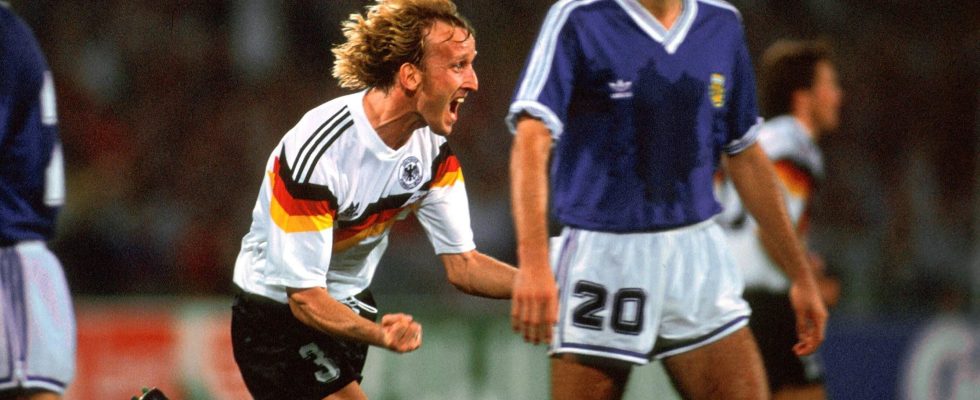On this side of the Rhine, he is not the first one that comes to mind when it comes to listing the world champions, whether they are West Germans or just Germans. On the other bank of the river, it’s another story, that of the best left-back to have worn the jersey of the Nationalmannschaft, if we consider that Paul Breitner was more than a full-back and that we judge Philipp Lahm more attracted to the right.
The only scorer in the 1990 World Cup final, Andreas Brehme became a legend in two ways that summer, offering the FRG/Germany its third global crown, a year in which it celebrated its rediscovered unity. Three months before his official reunification, seven after the fall of the Wall, Brehme, born on November 9, was popping champagne in Rome.
On this side of the Rhine and seen from my teenage bedroom, this is not what jumped out at me the most on July 8, 1990. At the end of a final as indigestible as the rest of a Cup of the catenaccio world, the Inter player was going to score the only goal in a tasteless match, on a very questionable penalty, but whose transformation with Brehme sauce was going to enhance the taste.
Firecrackers from the left, finesse from the right
Normally, this penalty should have been taken by the future Ballon d’Or, Lothar Matthaus. But that evening, the German leader didn’t feel it. His penalty – successful – in the quarter against Czechoslovakia left a bitter taste in his mouth. We might as well let Andreas Brehme, also an exercise specialist, hit. Particular specialist since ambidextrous.
Andreas Brehme converts his penalty in the 1990 World Cup final
Credit: Getty Images
In the final, no free kick but a penalty, therefore. The penalty of a lifetime against Sergio Goycochea, a little-known goalkeeper who became a demigod after a quarter and a half which saw him take five Yugoslav and Italian shots on goal. To beat the Argentine wall, you had to get up early. Or be very specific. Which Brehme did not fail to be.
The nets of the Olympic stadium still remember the caress of the Etrusco ball. Impossible to coax the leather better, to place it more flush with the right post. Anything less would have been straight into the arms of Goycochea. The run-up, almost perpendicular to the goal line, had left no clue. The strike, no chance.
Andreas Brehme, who converted a shot on goal from the left against Mexico in 1986, opted for the right this time. As often, in fact. Because the anomaly was 1986, not 1990. But at the time, when YouTube was not even a dream, when video analysis was limited to the match before (when the images were available) , no one had an eye on everything and Brehme covered his tracks perfectly.

